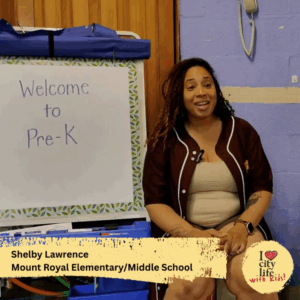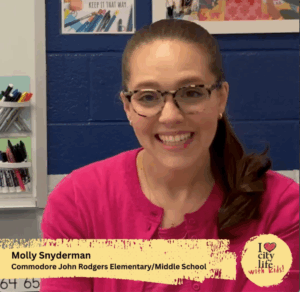Tips to Combat the “Summer Slide” – Part 1
Congratulations, parents: you’ve made it to summer! While it’s a wonderful time to embrace a slower pace away from the hustle and bustle of the school year, this season also offers families the chance to engage in some learning at home. We invited several early childhood educators to share their tips for preventing the “summer slide,” the learning loss that often occurs during the long summer break.

Shelby Lawrence, a kindergarten teacher at Mount Royal Elementary/Middle School, recommends integrating lessons into your daily routine:
- Maintain routines at home with fun learning opportunities. For example, set time aside every day to read together or play an educational game.
- Take time to review the completed work that teachers send home at the end of the year. Allow your child to tell you about the work they did and what they learned. For example: you find a worksheet where they colored things beginning with “h”. Ask them to name some more things that begin with “h”. This will give you an idea of the things they learned thoroughly and where there may be gaps in their understanding.
- Make literacy fun with letter sound activities. For example: before a beach day, use the letters in “beach” to find objects beginning with those sounds. Let the little one do the finding. B- blanket or ball, E- earphones, A- apple slices, C- cold drinks, H- hat, etc.

Molly Snyderman, a kindergarten teacher at Commodore John Rodgers Elementary/Middle School, also suggests making learning part of everyday life:
- For reading, focus on talking, reading, and playing with words. Look for letters on signs, read books aloud every day (even if it’s the same favorite over and over!), and play games like “What’s the first sound in banana?” or “Can you find something that rhymes with cat?” These little moments build the brain muscles that help kids become strong readers. Encourage kids to try sounding out words when they’re ready, but always celebrate their effort—confidence matters!
- For math, keep it hands-on and practical. Count steps as you climb them, group toys in sets of 5s or 10s, and use snacks or coins to show simple adding and subtracting. Ask questions like, “If we have 3 strawberries and eat 1, how many are left?”
- The most important thing? Keep it low-pressure and joyful. Kids learn best when they feel safe, seen, and curious. Summer is the perfect time to build those early skills in a fun, relaxed way.
Stay tuned for Part 2 of Preventing the Summer Slide with more helpful tips and tools!

- Save your recommendations for later.
- Get access to our Financial Incentives Tool.
- Connect with a Live Baltimore staff member for a one-on-one consultation.
- Get a free I ♥ City Life bumper sticker.

- Save your recommendations for later.
- Get access to our Financial Incentives Tool.
- Connect with a Live Baltimore staff member for a one-on-one consultation.
- Get a free I ♥ City Life bumper sticker.